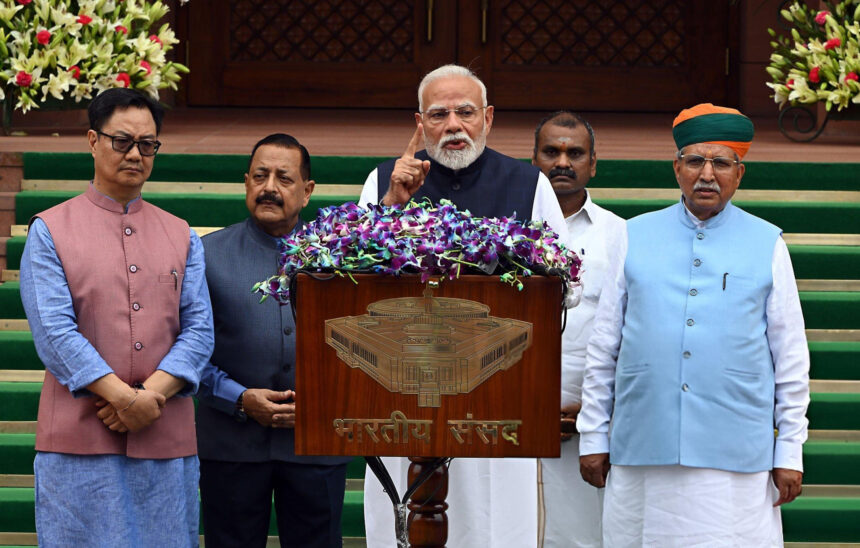As India gets ready for a heated Monsoon Session of Parliament, Prime Minister Narendra Modi spoke to the country and lawmakers urging them to stand together on national issues. He gave this talk just before the session began. In his speech, Modi praised Operation Sindoor, India’s military attack on terrorist bases across the Line of Control (LoC). He also had a clear message for the opposition: think of the country first, not politics
Operation Sindoor Showed Our Resolve, Parliament Must Reflect That Spirit
PM Modi addressed the Parliament complex describing Operation Sindoor as a defining moment in India’s military and diplomatic past. This action came as a response to the April 22 terror attack in Pahalgam, which took the lives of several Indian tourists and security staff. The operation involved a quick and precise attack deep into Pakistan-controlled Kashmir and certain areas beyond the international border.
“Our nation came together in sorrow and then in determination. In just 22 minutes, our troops destroyed the key hubs of terror. Now, Parliament needs to show the same unity in thinking and aim,” the Prime Minister stated.
Official reports indicate the strike had a successful outcome and symbolized India’s increasing self-sufficiency in defense. Many weapons used were developed within India as part of the “Make in India” program.
Global Military Optics: ‘Made in India’ Gets Global Attention
Prime Minister Modi extended his remarks beyond domestic achievements, pointing out that Operation Sindoor has generated heightened international interest in Indian defense systems. Multiple foreign delegations have reportedly reached out to evaluate indigenous technologies.
He commented, “From the deserts of Rajasthan to the negotiation tables in Geneva, ‘Made in India’ is now recognized and respected globally. In discussions with world leaders, there is a noticeable increase in confidence regarding our indigenous capabilities.”
India’s defense sector is currently attracting significant global attention. Nations from Southeast Asia, the Middle East, and Africa are actively engaging with New Delhi to explore collaborative ventures in defense manufacturing and procurement. The country’s military-industrial base is clearly gaining momentum, positioning India as a notable partner for joint production initiatives and technology transfers..
Storm Clouds in Parliament: Opposition Plans Aggressive Pushback
The Prime Minister’s remarks on the necessity for cooperative governance seem unlikely to temper the opposition’s stance. Congress, AAP, and allied parties have signaled a readiness for adversarial engagement, particularly in response to the Pahalgam security breach, which they attribute to systemic lapses.
Congress MP Renuka Chowdhury has formally submitted a request to initiate a structured discussion on what she has described as a “catastrophic intelligence failure.” Additionally, Congress is poised to interrogate the government’s foreign policy, especially amid reports suggesting US involvement in facilitating the ceasefire between India and Pakistan.
Congress leader Gaurav Gogoi emphasized the importance of preemptive security measures over retaliatory action, questioning the continued vulnerability to such attacks despite technological surveillance. He also highlighted the increasing complexity of India’s security landscape, referencing strategic challenges not only from Pakistan and China, but also from ongoing border dynamics with Bangladesh. The upcoming parliamentary session is expected to feature extensive scrutiny of the government’s internal and external security protocols.
The Strategic Undercurrents: Two-Front Challenge Looms Large
The ongoing Parliament session coincides with increased operational activity along India’s northern and western borders. Defense analysts have observed a notable uptick in coordination between Pakistan and China, with certain intelligence reports indicating logistical deployments near sensitive sectors in Ladakh and Arunachal Pradesh.
Within this framework, Prime Minister Modi’s focus on national unity appears to have a strategic undertone. Experts interpret this as an attempt by the government to present a unified domestic front, functioning as a deterrent amid escalating regional tensions.
As one senior official (who requested anonymity) put it, “Any perceived disunity within our democratic institutions compromises the effectiveness of our deterrence posture.”
Monsoon Session Legislative Agenda: Balancing Governance and Politics
Putting security aside for a moment, the Monsoon Session’s shaping up to be quite the legislative marathon, 16 bills on the docket, split evenly between new proposals and pending matters. Of particular technical interest:
- The National Cybersecurity Regulatory Authority Bill aims to establish a statutory framework for managing cyber threats.
- Then there’s the Digital Electoral Integrity Bill, targeting deepfakes and misinformation in the electoral process, an increasingly critical issue as technology evolves.
- Amendments to the Border Infrastructure Acceleration Act are also in the pipeline, apparently meant to simplify land acquisition procedures in sensitive border regions.
Sources within the BJP indicate that the administration is focused on pushing legislative productivity, despite political turbulence. As Parliamentary Affairs Minister Prahlad Joshi put it, “We welcome criticism, but not obstruction. Debate is healthy, deadlock is not.” It’s a clear signal that the government wants to keep business moving, regardless of external pressures.
PM Modi’s Parliamentary Strategy: A Calculated Balancing Act
Modi’s recent address appeared meticulously orchestrated, almost as if following a pre-set blueprint. His remarks strongly emphasized support for the armed forces and underscored themes of national unity, yet, notably, he refrained from launching direct criticism at the opposition. Instead, the Prime Minister concentrated on constructing a narrative around collective purpose and national consensus, a maneuver that seems both calculated and symbolically significant.
He concluded by stating, “In periods of security challenges, established democracies demonstrate solidarity. We have managed this previously and must do so again.” The venue was filled to capacity during his remarks.
What Lies Ahead: A Test for Indian Democracy
The Monsoon Session 2025 shapes up to be a significant stress test for India’s legislative machinery. With both internal disagreements and external pressures mounting, the performance of Parliament is under scrutiny, not just domestically, but on the global stage. The key issue isn’t military capability; that’s been demonstrated already. What remains is whether lawmakers can leverage effective negotiation, strategic consensus-building, and a genuine commitment to the public interest. The session will reveal if the institution can function with the clarity and resolve demanded by current circumstances, or if political gridlock will prevail yet again.










